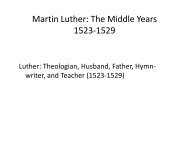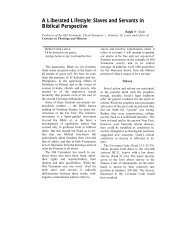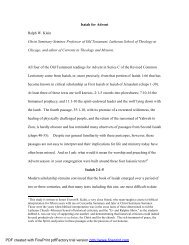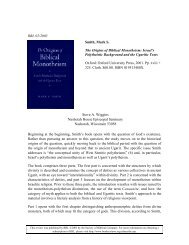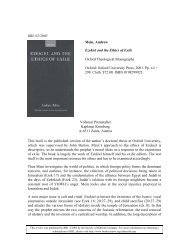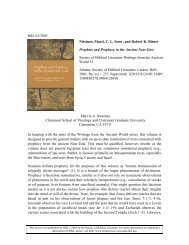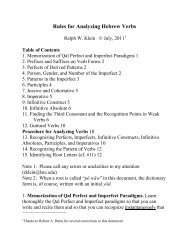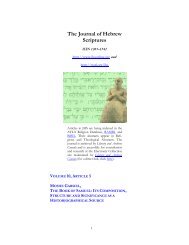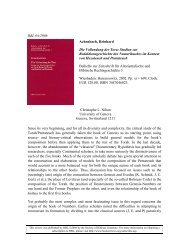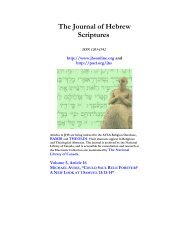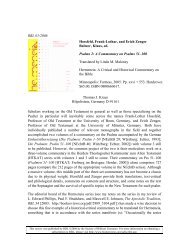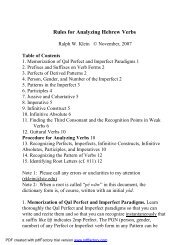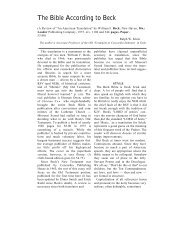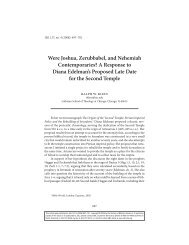“GO, I BEG YOU, TAKE YOUR BELOVED SON AND SLAY HIM ...
“GO, I BEG YOU, TAKE YOUR BELOVED SON AND SLAY HIM ...
“GO, I BEG YOU, TAKE YOUR BELOVED SON AND SLAY HIM ...
Create successful ePaper yourself
Turn your PDF publications into a flip-book with our unique Google optimized e-Paper software.
6 isaac kalimi<br />
freedom of choice, but at the same time he requested him to make “the<br />
right” choice so that everyone acknowledged Abraham’s righteous and<br />
unconditional belief. Thus, B. San. 89b recounts:<br />
R. Simeon ben Abba said, “Na (אנ) can only denote entreaty. This may<br />
be compared to a king of flesh and blood who was confronted by many<br />
wars, which he won by the aid of a great warrior. Subsequently he was<br />
faced with a severe battle. Thereupon he said to him, ‘I pray you, assist<br />
me in battle that people may not say, “There was no reality in the earlier<br />
ones.”’ So also did the Holy One, blessed be He, say to Abraham, ‘I have<br />
tested you with many trials and you were withstanding all. Now, be firm<br />
for my sake in this trial, that men may not say there was no reality in<br />
the earlier ones.’”<br />
Though the rabbis did not criticize God on particular points, apparently<br />
they questioned the Aqedah story as a whole. In other words, even<br />
if the Aqedah is just a “test” of Abraham’s belief, and in fact testing of<br />
a human by God plays an important role in the biblical thought, 19 still<br />
it is too cruel. Is there any justification for such a cruel test? Why did<br />
God suddenly ask Abraham to sacrifice his beloved son?<br />
In order to solve this difficulty, the rabbis searched the immediate<br />
opening phrase of the story: הלאה םירבדה רחא יהיו (Gen. 22:1a). This<br />
phrase is well known particularly from narrative and historical sections<br />
of the Hebrew Bible 20 and generally means “sometime afterward.” 21 It<br />
is a technical, even fossilized, phrase that connects stories or determines<br />
the relative position of a story within a chain of stories. From time to<br />
time, it replaces a precise date found in the earlier text. 22 Nonetheless,<br />
in early Jewish exegesis the phrase was grasped as the definition of a<br />
chronological sequence of a story and related with story/ies recounted<br />
previously. The term םירבד (plural, derived from רבד) is interpreted:<br />
either as a “word” (e.g., Gen. 39:17; 44:4–7; Deut. 1:1; 4:12) or as<br />
command to Abraham “Go to the land that I will show you” (Gen. 12:1) and end with<br />
the same words: “Go to . . . one of the mountains that I will tell you” (Gen. 22:2). For<br />
a detailed discussion of this literary feature in the Abraham cycle, see Kalimi, “The<br />
Land/Mount Moriah,” pp. 9–10. For the characteristic reaction of Abraham in the<br />
“first” and “last” trial, see below, n. 33.<br />
19 See, for example, Exod. 15:25; 16:4; Deut. 8:2, 16; 13:4; Judg. 2:22; Job 1–2.<br />
20 Among its many appearances (e.g., Gen. 15:1; 39:7; 48:1), it is noteworthy to<br />
mention the immediate one in the following paragraph of the chapter under review,<br />
Gen. 22:20a.<br />
21 Compare the translation in the Jewish Study Bible of Gen. 22:1: “Some time<br />
afterward.”<br />
22 Compare, for instance, 2 Chr. 32:1 with 2 Kgs. 18:13//Is. 36:1; and see I. Kalimi,<br />
The Reshaping of Ancient Israelite History in Chronicles (Winona Lake, 2005), pp. 23–24.



